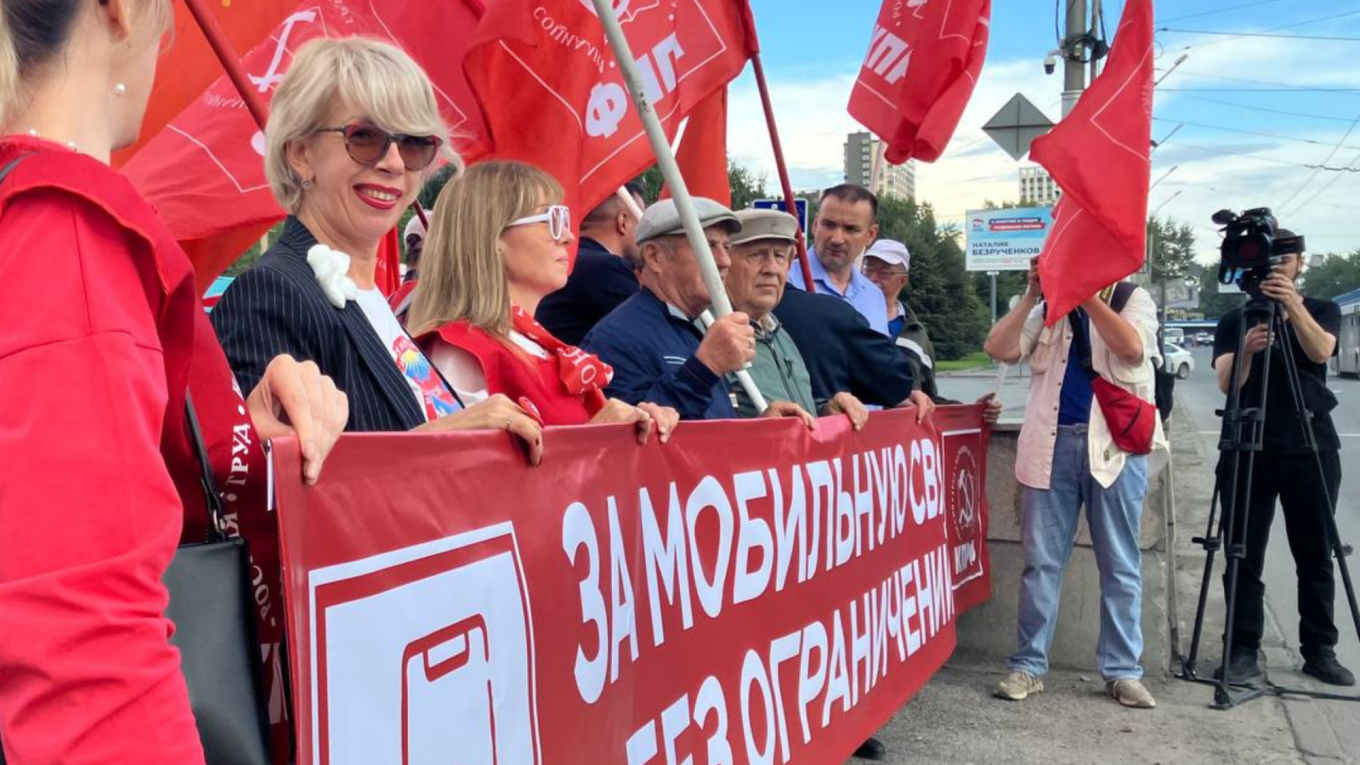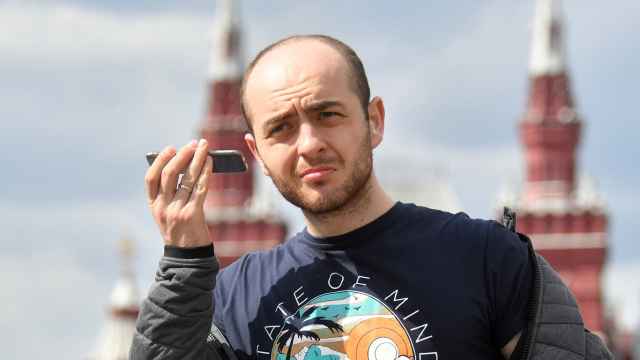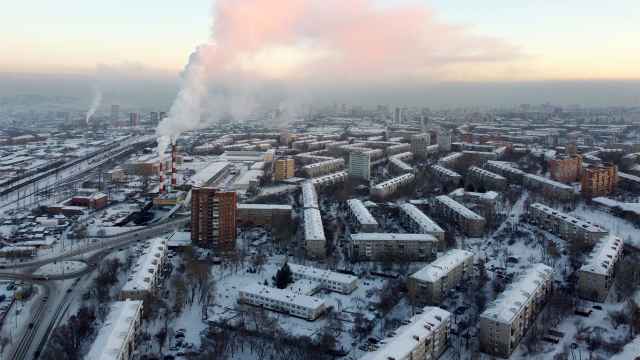Hello and welcome to Regions Calling, The Moscow Times’ weekly newsletter on developments beyond the Russian capital.
Though Russia has long flirted with the idea of a “sovereign internet,” when our editorial team named this newsletter “Regions Calling,” we did not expect events to take the turn that they did. Indeed, for over a week now, calling has become the one thing that people across Russia’s regions are struggling to do after authorities restricted voice and video calls on WhatsApp and Telegram.
In this week’s edition, we will dive into how the throttling of Russia’s two most popular messaging apps is transforming the lives of ordinary citizens and the vast diaspora.
But first, here’s a look at what else happened in the regions:
The Headlines
The widely unpopular Kremlin-initiated local governance reform is again in the headlines after courts in the republic of Altai and the Krasnoyarsk region rejected a lawsuit challenging it.
Backed by the two regions’ Kremlin-appointed heads, the reform is widely seen as being detrimental to the livelihoods of the many village residents, who will no longer be able to elect their own representatives and will have fewer opportunities to defend their interests within the government system.
A political drama is unfolding in the republic of Sakha (Yakutia) after the head of Russia’s center-right New People party Alexei Nechayev called for the expulsion of Sakha parliament member Alexander Ivanov from the party.
The move comes after several pro-government Telegram channels and news agencies accused Ivanov of harboring Sakha nationalist, separatist and even pan-Turkist sentiments, citing his interview with Turkish blogger Cem Kiran published last year. Ivanov denied all accusations, arguing that the citations used in the exposés were taken out of context.
In the republic of Tyva, a local doctor is sounding the alarm about a sudden spike in coronavirus cases among children and the elderly.
“We have reopened wards for treating coronavirus patients and are operating in a state of high preparedness,” Anna Saryglar, the head of a hospital in the regional capital Kyzyl, said in a post on VKontakte.
And in the republic of Bashkortostan, the Russian rights group Memorial has designated 46 defendants in the Baymak case as political prisoners.
Russia’s oldest rights group called the repressions stemming from last year’s Baymak protests “unprecedented even for Putin’s Russia.”
The Spotlight
‘Losing a Lifeline’: Russians Adapt to Restrictions On Global Messaging Apps
About a dozen people gathered in central Novosibirsk, Siberia’s largest city, on Tuesday for a rare authorized protest.
“For mobile service with no restrictions,” read the banner carried by the demonstrators alongside flags of the Soviet Union and Russia’s Communist Party, which organized the event. Only a few young faces could be spotted among the demonstrators, with pensioners making up the majority.
The small rally came nearly two weeks after Russians first reported issues with placing voice and video calls through WhatsApp and Telegram.
Following days of uncertainty, state communications watchdog Roskomnadzor finally confirmed last Wednesday that it was throttling calls placed through the apps to “counter criminal activity.”
The Moscow Times spoke to dozens of users from across Russia as well as some in the diaspora who have for years relied on these apps to stay in touch with friends and relatives inside the country.
All of them asked to be cited anonymously for safety reasons.
One thing our small survey revealed is that the restrictions are far from being foolproof — at least for the time being — and can vary based on mobile carrier and geographic location within the country and even within the same region.
“I am based in St. Petersburg and my parents are in the republic of Sakha. I am using VPN to call them on WhatsApp, but for them, the app works fine without a VPN,” one young woman said.
“It seems like communication restrictions are more relaxed in the republic. In St. Petersburg, I can’t even connect to a VPN when on mobile internet, but in Sakha, it is very much possible,” she added.
Although its parent company Meta was banned as “extremist” in 2022, WhatsApp remains unrivaled in its position as Russia’s most popular messaging app.
The app was used by more than 97 million people over the age of 12 in Russia in July, according to statistics maintained by independent Russian media monitor Mediascope. Telegram came in close second with just over 90 million users, while homegrown VK Messenger had just over 16 million users.
Some Russians told The Moscow Times they had no plans to abandon their favorite messengers and would continue relying on VPN services to place calls, especially on Telegram. Yet it is unclear how much longer this workaround will be feasible.
“Popular VPNs produce some distinguishable fingerprints...Filtering tools placed in the internet backbone infrastructure can be used to identify and block such traffic that matches the signature of a known VPN service,” said Steve Sacks, a digital risks expert based in Washington, DC.
“While this may be harder to enforce with less mainstream VPN providers, Russian government agencies would likely continue to update the fingerprint matching filter rules regularly to try to stay ahead of illicit VPN users,” Sacks told The Moscow Times, noting that Russian authorities can also add more VPN providers to its growing list of outlawed applications.
Many users in Russia, however, appear to be opting for convenience.
“Not all of my older relatives want to set up a VPN, so everyone in my family chat is downloading Google Meet,” said a man from the republic of Bashkortostan.
“My family lives in Russia, while I am based in Europe. My parents asked me to register on Chinese messenger WeChat to move our family group chat there,” said one woman, referring to the messenger operated by China-based company Tencen, which operates under a requirement to turn over user data to the Chinese authorities in cases deemed important for national security.
Google Meet climbed to second place among the most-downloaded free communication apps in the Russian App Store amid the first reports of restrictions on WhatsApp and Telegram calls.
The top spot was occupied by Max, a domestic app expected to become Russia’s national messaging platform similar to WeChat. Though still in its testing phase, Max has already earned a reputation for being nothing short of a surveillance tool used by the government.
The Kremlin has already ordered government officials and lawmakers to migrate their Telegram channels to Max, and a similar mandate was handed down to civil servants across the country, according to The Moscow Times’ sources and local media reports.
“I know that medical workers, teachers and even parents of schoolchildren are now using Max because they were told to,” one Russian woman told The Moscow Times, adding that she herself had no plans to do so. “I don’t work for the government, so I have no need to install the app — this is also true for all people working in private companies.”
Russians who spoke with The Moscow Times were divided in their opinions on Max.
While some said downloading the app was out of the question for them because of its security vulnerabilities, others said they had no choice but to install the app at the request of their government employer.
Yet others said they downloaded the app out of convenience and because “the government is already tracking me from every corner, what is one more app?”
“I definitely won’t switch to Max. Better to use regular calls than that,” said a political activist from St. Petersburg. “My parents know what kind of work I am engaged in, so we generally don’t talk about any sensitive stuff over the phone.”
As it is only accessible to domestic users, Max is not an option for millions of Russians trying to stay in touch with their loved ones living abroad — even in cases where the latter are willing to potentially compromise their security by downloading it.
The impact of the new restrictions also differs across generations.
“My parents are in their 70s. My father is tech-savvy and my mother is not, but now she will be forced to learn how to use VPNs and new apps,” said one political emigre. “It will be next to impossible for me to try and stay in touch with my other non-savvy relatives.”
Though Russia might be years away from erecting a digital firewall like China’s, these first restrictions might have already proven fruitful for the authorities in some regards.
“My uncle used WhatsApp to text and talk to his cousin in Ukraine. Now they are losing the only lifeline between them. They are in their late 70s and had to put in a lot of effort to learn how to use WhatsApp, so a VPN or other messengers are not really an option at this point,” one woman living in exile told The Moscow Times.
“We don’t talk about this enough when we discuss the restrictions: without them, Russian and Ukrainian families still continued to talk to each other,” she added.
Photo of the Week

Last week, activists in Bashkortostan marked five years since protests in defense of the Kushtau mountain, one of the few successful grassroots protests in Russia’s modern history.
In the years since, many of the prominent figures who protested at Kushtau have been forced to leave the country or jailed as part of the Baymak case. Yet a small group of protest participants and their families nonetheless gathered near the mountain on Saturday to share memories of the final day of the standoff.
The Moscow Times marked the anniversary with a two-part series exploring the political context that set the stage for the protests and how they unfolded. Part one of the series is available here.
Culture & Entertainment
- The second Festival of Yakutian Cinema in Paris will take place in the French capital from Sept. 19-21. Since the 2010s, the republic of Sakha (Yakutia) has emerged as a cradle of independent Indigenous-made cinema in Russia. Despite their modest budgets and frequent reliance on amateur actors, films produced in “Sakhawood” have earned fans and accolades worldwide. More information on the upcoming Paris festival is available here.
- The first solo exhibition by Chuvash artist Aysha Demina will be on display from Sept. 4-6 at Espace 49 gallery in Paris. Information about the event is available here. And if you are in Amsterdam, you can see Aysha’s works at the ongoing Artists Against the Kremlin exhibition, organized by The Moscow Times and All Rights Reversed gallery at De Balie.
A Message from The Moscow Times:
Dear readers,
We are facing unprecedented challenges. Russia's Prosecutor General's Office has designated The Moscow Times as an "undesirable" organization, criminalizing our work and putting our staff at risk of prosecution. This follows our earlier unjust labeling as a "foreign agent."
These actions are direct attempts to silence independent journalism in Russia. The authorities claim our work "discredits the decisions of the Russian leadership." We see things differently: we strive to provide accurate, unbiased reporting on Russia.
We, the journalists of The Moscow Times, refuse to be silenced. But to continue our work, we need your help.
Your support, no matter how small, makes a world of difference. If you can, please support us monthly starting from just $2. It's quick to set up, and every contribution makes a significant impact.
By supporting The Moscow Times, you're defending open, independent journalism in the face of repression. Thank you for standing with us.
Remind me later.







